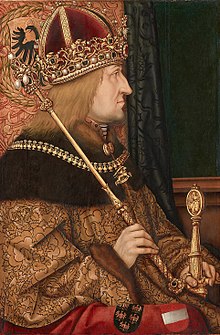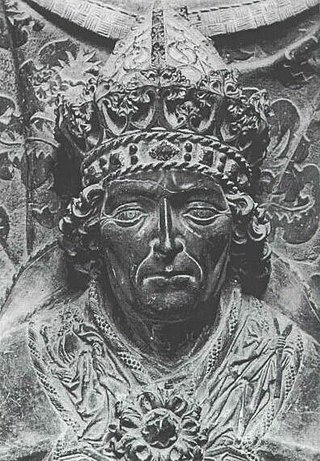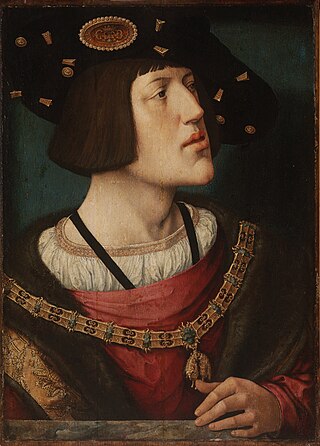
The imperial election of 1440 was an imperial election held to select the emperor of the Holy Roman Empire. It took place in Frankfurt on February 2.

The imperial election of 1440 was an imperial election held to select the emperor of the Holy Roman Empire. It took place in Frankfurt on February 2.
Albert II of Germany, King-elect of Germany, died on October 27, 1439. The prince-electors convened to replace him were:
The throne of Bohemia was vacant. Albert was king of Bohemia and his firstborn son Ladislaus the Posthumous would not be born until February 22.
Frederick, duke of Styria, Carinthia and Carniola and regent of Austria, was elected.
Frederick III was crowned in Rome by the pope on March 19, 1452. He was the lineal ancestor of all subsequent emperors of the House of Habsburg.

Louis IV, called the Bavarian, was King of the Romans from 1314, King of Italy from 1327, and Holy Roman Emperor from 1328 until his death in 1347.

Rudolf I was the first King of Germany from the House of Habsburg. The first of the count-kings of Germany, he reigned from 1273 until his death in 1291.

Adolf was the count of Nassau from about 1276 and the elected king of Germany from 1292 until his deposition by the prince-electors in 1298. He was never crowned by the pope, which would have secured him the imperial title. He was the first physically and mentally healthy ruler of the Holy Roman Empire ever to be deposed without a papal excommunication. Adolf died shortly afterwards in the Battle of Göllheim fighting against his successor Albert of Habsburg.

Frederick the Fair or the Handsome, from the House of Habsburg, was the duke of Austria and Styria from 1308 as well as the anti-king of Germany from 1314 until 1325 and then co-king until his death.

The House of Luxembourg or Luxembourg dynasty was a royal family of the Holy Roman Empire in the Late Middle Ages, whose members between 1308 and 1437 ruled as kings of Germany and Holy Roman emperors as well as kings of Bohemia, Hungary and Croatia. Their rule was twice interrupted by the rival House of Wittelsbach. The family takes its name from its ancestral county of Luxembourg which they continued to hold.
In the Holy Roman Empire, the Great Interregnum was a period of time, from approximately 1254 until 1273, following the throne dispute of Frederick II where the succession of the Holy Roman Empire was contested and fought over between pro- and anti-Hohenstaufen factions. Starting around 1250 with the death of Frederick II, the conflict over who was the rightful emperor and King of the Romans would continue into the 1300s until Charles IV of Luxembourg was elected emperor and secured succession for his son Wenceslaus. This period saw a multitude of emperors and kings be elected or propped up by rival factions and princes, with many kings and emperors having short reigns or reigns that became heavily contested by rival claimants.
The imperial election of 22 May 1400 was an imperial election held to select the emperor of the Holy Roman Empire. It took place in Frankfurt.

The imperial election of 21 August 1400 was an imperial election held to select the emperor of the Holy Roman Empire. It took place in Rhens.
The imperial election of 1438 was an imperial election held to select the emperor of the Holy Roman Empire. It took place in Frankfurt on March 18.

The imperial election of 1519 was an imperial election held to select the emperor of the Holy Roman Empire. It took place in Frankfurt on the 28th of June.
The imperial election of 1619 was an imperial election held to select the emperor of the Holy Roman Empire. It took place in Frankfurt on August 28.
The imperial election of 1636 was an imperial election held to select the emperor of the Holy Roman Empire. It took place in Regensburg on December 22.
The imperial election of 1653 was an imperial election held to select the emperor of the Holy Roman Empire. It took place in Augsburg on May 31.

The imperial election of 1742 was an imperial election held to select the emperor of the Holy Roman Empire. It took place in Frankfurt on January 24. The result was the election of Charles Albert of Bavaria, the first non-Habsburg emperor in three hundred years.
The imperial election of 1745 was an imperial election held to select the emperor of the Holy Roman Empire. It took place in Frankfurt on September 13.

The imperial election of 1273 was an imperial election held to select the emperor of the Holy Roman Empire. It took place in Frankfurt on October 1.
The imperial election of 1292 was an imperial election held to select the emperor of the Holy Roman Empire. It took place in Frankfurt on May 5. Emperor Rudolf I of Germany had died on 15 July 1291.

The imperial election of 19 October 1314 was an imperial election held to select the emperor of the Holy Roman Empire. It took place in Sachsenhausen, near Frankfurt.

The imperial election of 20 October 1314 was an imperial election held to select the emperor of the Holy Roman Empire. It took place in Frankfurt.

The 1257 imperial election was a double election in which the prince-electors of the Holy Roman Empire split into factions and elected two rivals, earl Richard of Cornwall and King Alfonso X of Castile, each claiming to have been legally elected.